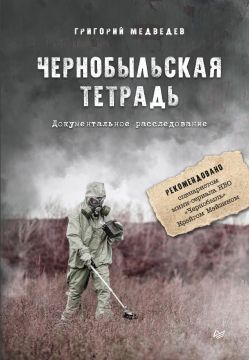Чернобыльская тетрадь. Документальное расследование

|
Григорий Медведев – инженер-атомщик, писатель. Участвовал в строительстве ЧАЭС в должности заместителя главного инженера станции. «Чернобыльская тетрадь» – одна из самых известных книг о чернобыльской катастрофе, неоднократно переиздавалась и была переведена на многие языки мира. Это свидетельство из первых рук, основанное на документах и многочисленных показаниях очевидцев, опрошенных автором, который был командирован в Чернобыль сразу после аварии. Читатель узнает о причинах аварии, ее развитии, включая поминутный анализ происходивших событий, а также о героизме людей, которые ликвидировали ее последствия. Книга удостоена наград газет Los Angeles Times и New York Times, а также использовалась при создании документальных и художественных фильмов.
Автор: Григорий Устинович МедведевСтраниц: 23


